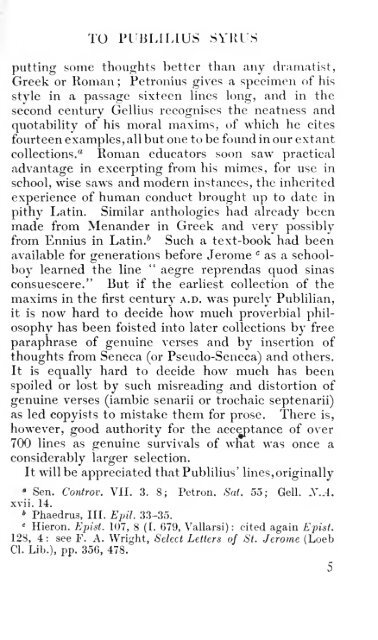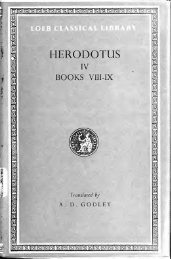- Page 5 and 6: MINOR LATIN POE^^WITH INTRODUCTIONS
- Page 7 and 8: CONTENTSPreface ......PAGEixPuBLiLi
- Page 9: CONTENTS" Phoenix " : Introduction
- Page 12 and 13: —PREFACE\'ollmer, have devoted sc
- Page 14 and 15: PREFACEThe English versions compose
- Page 17: INTRODUCTIONTO PUBLILIUSSYRUSTo the
- Page 21 and 22: f;TO PUBLILIIS SYRUSthe so-called "
- Page 23 and 24: TO PUBLILIUS SYRUSO. Kibheck. P. Pu
- Page 25 and 26: TO PUBLILIUS SYRUS212 double-column
- Page 28 and 29: MINOR LATIN POETSEAlienum est omne
- Page 30 and 31: :MINOR LATIN POETSAvarus ipse miser
- Page 32 and 33: MINOR LATIN POETS30 Anus cum ludit
- Page 34 and 35: MINOR LATIN POETSAvaro acerba poena
- Page 36 and 37: MINOR LATIN POETSBona nemini hora e
- Page 38 and 39: MINOR LATIN POETSBonuin quod est su
- Page 40 and 41: MINOR LATIN POETSBona turpitude est
- Page 42 and 43: MINOR LATIN POETSCrudelem medicum i
- Page 44 and 45: MINOR LATIN POETS120 Crimen relinqu
- Page 46 and 47: MINOR LATIN POETSCave amicum credas
- Page 48 and 49: MINOR LATIN POETSEDiscipulus est pr
- Page 50 and 51: MINOR LATIN POETSnDiniissum quod ne
- Page 52 and 53: MINOR LATIN POETSEtiam celeritas in
- Page 54 and 55: MINOR LATIN POETSZ I Est utique pro
- Page 56 and 57: MINOR LATIN POETS210 Facilitas anim
- Page 58 and 59: MINOR LATIN POETS225 Facile invenie
- Page 60 and 61: MINOR LATIN POETSSHeu quam difficil
- Page 62 and 63: MINOR LATIN POETSHoneste servit qui
- Page 64 and 65: MINOR LATIN POETSInvitum cum retine
- Page 66 and 67: MINOR LATIN POETSInvidia tacite sed
- Page 68 and 69:
MINOR LATIN POETSInvidia id loquitu
- Page 70 and 71:
MINOR LATIN POETSInertia est labori
- Page 72 and 73:
MINOR LATIN POETSLaus nova nisiorit
- Page 74 and 75:
MINOR LATIN POETSLicentiam des ling
- Page 76 and 77:
MINOR LATIN POETSMortuo qui mittit
- Page 78 and 79:
MINOR LATIN POETSMalivolus semper s
- Page 80 and 81:
MINOR LATIN POETS395 Malus bonum ad
- Page 82 and 83:
MINOR LATIN POETSMiserrimum est arb
- Page 84 and 85:
MINOR LATIN POETSNullus est tarn tu
- Page 86 and 87:
MINOR LATIN POETSNisi vindices deli
- Page 88 and 89:
MINOR LATIN POETSNee vita nee fortu
- Page 90 and 91:
MINOR LATIN POETSNisi per te sapias
- Page 92 and 93:
MINOR LATIN POETSO dulce tormentum
- Page 94 and 95:
MINOR LATIN POETSPlus est quani poe
- Page 96 and 97:
MINOR LATIN POETSPars benefici est
- Page 98 and 99:
MINOR LATIN POETSPotenti irasci sib
- Page 100 and 101:
MINOR LATIN POETSPericla qui audet
- Page 102 and 103:
MINOR LATIN POETSQuicquid conaris,q
- Page 104 and 105:
MINOR LATIN POETS575 Qui in vero du
- Page 106 and 107:
MINOR LATIN POETSQuod improbis erip
- Page 108 and 109:
MINOR LATIN POETSQuam miserum est b
- Page 110 and 111:
MINOR LATIN POETSQuanto serius pecc
- Page 112 and 113:
MINOR LATIN POETSOQuern diligas, ni
- Page 114 and 115:
MINOR LATIN POETSZRogare officium s
- Page 116 and 117:
MINOR LATIN POETSSecunda in paupert
- Page 118 and 119:
MINOR LATIN POETS670 Stultum est vi
- Page 120 and 121:
MINOR LATIN POETSSuspicio probatis
- Page 122 and 123:
MINOR LATIN POETSUbi peccat aetas m
- Page 124 and 125:
MINOR LATIN POETS720 \'oluptas taci
- Page 127:
ELEGIAE INMAECENATEMVOL. I.
- Page 130 and 131:
INTRODUCTIONperiod. Haupt's endeavo
- Page 132 and 133:
INTRODUCTIONF. Biicheler, and A. Ri
- Page 134 and 135:
ELEGIAE INMAECENATEMIDefleram iuven
- Page 136 and 137:
MINOR LATIN POETSPallade cum docta
- Page 138 and 139:
MINOR LATIN POETSmaluit iimbrosam q
- Page 140 and 141:
MINOR LATIN POETShie modo miles era
- Page 142 and 143:
MINOR LATIN POETSultra numquid erat
- Page 144 and 145:
MINOR LATIN POETSconglaciantur aqua
- Page 146 and 147:
MINOR LATIN POETSut tibi vita foret
- Page 148 and 149:
MINOR LATIN POETSNestoris annosi vi
- Page 150 and 151:
sed manifestus erat :MINOR LATIN PO
- Page 152 and 153:
MINOR LATIN POETSsit secura tibi qu
- Page 155:
iGRATTIUS
- Page 158 and 159:
INTRODUCTION'v\ith the East which G
- Page 160 and 161:
INTRODUCTIONthe subject has decided
- Page 162:
IXTRODUCTION TO GRATTIUSFr. Buechel
- Page 165 and 166:
IGRATTIUSTHE CHASE•"Under thine a
- Page 167 and 168:
GRA'ITIUSattained its fro:i\. Tlie
- Page 169 and 170:
IIGRATTIUSthat makes a length to st
- Page 171 and 172:
GRATTIUSin damp e(jiiipment there i
- Page 173 and 174:
IGRATTIUSto whom sea «ind earth an
- Page 175 and 176:
GiLvrriusnooses " it is rcconiincnd
- Page 177 and 178:
.UA'ITlUSLater, there succeeded to
- Page 179 and 180:
(iUATTlUSwith its service the uncou
- Page 181 and 182:
(iRA'mUSthousand hinds " and they e
- Page 183 and 184:
GRATTIUSO how great your reward, ho
- Page 185 and 186:
(iUATTlUS})U})pics of a Gelonian mo
- Page 187 and 188:
GRATTIUSclaimSparta," by common rep
- Page 189 and 190:
GRArrii's(lilt it's are regulated",
- Page 191 and 192:
GRATTIUSas my soiifjs shall last, a
- Page 193 and 194:
neitlier too shasrgy nor yet unable
- Page 195 and 196:
(JUAITIUScumbered and impressed by
- Page 197 and 198:
GUA'niUSof nard-beariiio- Ganges an
- Page 199 and 200:
(iiiArnusand, when he grasps his we
- Page 201 and 202:
GRAITIUSbe entreated who can guaran
- Page 203 and 204:
GRArnusis devastating her own fair
- Page 205 and 206:
GRArriusWhat need to record primiti
- Page 207 and 208:
GRATTIUSdoses of bitumen, mixed wit
- Page 209 and 210:
GRATTIUS\'iilcan's acknowledged hau
- Page 211 and 212:
''GRATTIUSis good at heart and is r
- Page 213 and 214:
GRAniL'Sslujig^ish lethartry or any
- Page 215 and 216:
GRATTIUSprofession. Some show defic
- Page 217 and 218:
from halters :GRAITIUSthe horse wil
- Page 219:
GRATTIUSthe shrines. For the hunter
- Page 223 and 224:
INTRODUCTIONTO CALPURXIUS SICULUSTh
- Page 225 and 226:
CALPURNIUS SICULUSeclogues of Nemes
- Page 227 and 228:
CALPUllNIUS SICULUSafter the manner
- Page 229 and 230:
CALPURNIUS SKL LUSC. Giarratano. Ca
- Page 231 and 232:
CALPLRXIUS SICULUSAx Intervening Ci
- Page 233 and 234:
CALPURNIUSSICULUSECLOGUE ICoRYDON :
- Page 235 and 236:
'peoplesCALPURNIUS SICULUS\.Now we
- Page 237 and 238:
CALPIRNIUS SICULUSpleaded a success
- Page 239 and 240:
CALPLllXIUS SICULUSluislied the cla
- Page 241 and 242:
ICALPURNIUS SICULUSOrnytus, Umv^ ha
- Page 243 and 244:
CALPURNIUS SICULUShastening torrent
- Page 245 and 246:
C'ALPURNIUS SK'ULUSit. insoinucli t
- Page 247 and 248:
CALPURNIUS SICULUS1 too have been w
- Page 249 and 250:
CALPURNIUS SICULUS. Tell mc, pray,
- Page 251 and 252:
CALPl RNIUS SICULUSl)n>om and yt*l
- Page 253 and 254:
CALPURXIUS SICULUS\\ lien I saw thi
- Page 255 and 256:
CALPLRNIUS SICl LISmc, fountains lo
- Page 257 and 258:
CALPURNIIS SICULISflo^vor wlu-n you
- Page 259 and 260:
CALPLRNIUS SK LLUS'ECLOGUE IVMelibo
- Page 261 and 262:
CALPURNIUS SICULUSBoy, break your }
- Page 263 and 264:
( ALPrUNUS SKILLSill sooth, the dis
- Page 265 and 266:
CALPl KMUS SICULUS•4 He is, I own
- Page 267 and 268:
kCALPURNIUS SICULUSCaesar, now stan
- Page 269 and 270:
'spadeCALPrilNirS SICULUSJ No more
- Page 271 and 272:
, ThouIspan'^TheCALPLRNIUS SICULUSO
- Page 273 and 274:
[187.IheI'. C'ALPUUNIUS SKULrS'the
- Page 275 and 276:
CALPIIRNIUS SICULl'Sbrowsing on the
- Page 277 and 278:
CALPUUNIUS SICULUSof (lawn, [\\v ni
- Page 279 and 280:
CALPURNius sicrLrsHocks to the wate
- Page 281 and 282:
I itsi burningCALPURNIUS SICULUSstr
- Page 283 and 284:
ICALPLRNUS SKULL'Siting winter swoo
- Page 285 and 286:
. That. May. No. OICALPURNIUS SICUL
- Page 287 and 288:
CALPURNIUS SICULUScan't bring true
- Page 289 and 290:
1 CALPURNIUS1 crags'
- Page 291 and 292:
CALPURNIUS SICULUSL,. 1 pray you, M
- Page 293 and 294:
'=CALPURNIUS SICULUSECLOGUE VIILyco
- Page 295 and 296:
I aw• 1 lyCALPrUNIUS SICULUSa the
- Page 297 and 298:
CALPURNIUS SICULUSLook, the partiti
- Page 299:
"^BarthCALPl UN I us SICULUSaitua p
- Page 303 and 304:
IINTRODUCTIONTO LAUS PISOXISThe Pai
- Page 305 and 306:
LAUS PISONISC. Beck. Statu ad Pison
- Page 308 and 309:
LAUSPISONISUxDE prills coepti surga
- Page 310 and 311:
MINOR LATIN POETSquam mihi priscoru
- Page 312 and 313:
MINOR LATIN POETSseu trepidos ad iu
- Page 314 and 315:
MINOR LATIN POETSinclita Nestorei c
- Page 317 and 318:
PANEGYRIC ON PISOhushed. For then h
- Page 319 and 320:
PANEGYRIC ON PISOan equal : neither
- Page 321 and 322:
PANEGYRIC OX PISOrange " of good ii
- Page 323 and 324:
•^ExcursusPANEGYRIC ON PISOmayhap
- Page 325 and 326:
PANEGYRIC OX PISOwhole crowd, sweat
- Page 327 and 328:
PANEGYRIC OX PISOlong life, disting
- Page 329:
PANEGYRIC OX PISOMaecenas drew out
- Page 333 and 334:
iINTRODUCTIONTO EINSIEDELN ECLOGUES
- Page 335 and 336:
EINSIEDELN ECLOGUESGolden Age in th
- Page 337 and 338:
Y 2
- Page 339 and 340:
EINSIEDELN ECLOGUES[The personages
- Page 341 and 342:
IEINSIEDELN ECLOGUESLa. What avails
- Page 343 and 344:
EINSIEDELN ECLOGUESsped thunder wit
- Page 345 and 346:
EINSIEDELN ECLOGUESwhose) full bear
- Page 347 and 348:
EINSIEDELN ECLOGUESPleasure and dro
- Page 349:
EINSIEDELN ECLOGUESour youth can di
- Page 353 and 354:
INTRODUCTIONTO PRECATIO TERRAEAND P
- Page 355 and 356:
AND PRIICATIOOMNIUM HKRBARUMfirst p
- Page 357 and 358:
iALITANY TO EARTHGoddess revered, O
- Page 359 and 360:
TA PRAYER TO ALL H1:RBSthee, (iodde
- Page 361:
A PRAYER TO ALL HERBSsoever man 1 p
- Page 365 and 366:
INTRODUCTIONTO AETNAThe poem on Aet
- Page 367 and 368:
AETNAconsideration and dismissed it
- Page 369 and 370:
AETNAJ. Maehly. Beitrage cur Kritik
- Page 371 and 372:
AETNARobinson Kllis' scholarshij),
- Page 373 and 374:
AETNAAetxa shall be my poetic theme
- Page 375 and 376:
AETNAWho has not told '^ of the Col
- Page 377 and 378:
AETNAThere is this second form of p
- Page 379 and 380:
IAETNArrents throuiih the a>-t
- Page 381 and 382:
AETNABVeacus, in the world of sliad
- Page 383 and 384:
AETNAthrown at random, so as to for
- Page 385 and 386:
AETNAand buried them in its fateful
- Page 387 and 388:
AETNAinore furious in coiitined spa
- Page 389 and 390:
AETNAvacuum contaitis nothinti; to
- Page 391 and 392:
AETNAt luliire fires yet [to make i
- Page 393 and 394:
AETNAsand. They come not so of thei
- Page 396 and 397:
MINOR LATIN POETSsed prior haec hon
- Page 398 and 399:
MINOR LATIN POETSplenaqiie desecto
- Page 400 and 401:
MINOR LATIN POETSnam veluti sonat o
- Page 402 and 403:
MINOR LATIN POETSprincipiis aliis c
- Page 404 and 405:
MINOR LATIN POETSquod si forte puta
- Page 406 and 407:
MINOR LATIN POETScorpora diripiat,
- Page 408 and 409:
IMINOR LATIN POETShaud aliter quam
- Page 410 and 411:
MINOR LATIN POETSuritur adsidue cal
- Page 412 and 413:
MINOR LATIN POETSvix umquani redit
- Page 414 and 415:
MINOR LATIN POETSin mercem legitur,
- Page 416 and 417:
esMINOR LATIN POETSmateriani accend
- Page 418 and 419:
'.MINOR LATIN POETScongeries saxis,
- Page 420 and 421:
MINOR LATIN POETSet qua disclusa es
- Page 422 and 423:
MINOR LATIN POETSconservatque notas
- Page 424 and 425:
MINOR LATIN POETSincomperta iacent
- Page 426 and 427:
MINOR LATIN POETSeruimus cunctasque
- Page 428 and 429:
MINOR LATIN POETSacciperis, solis T
- Page 430 and 431:
MINOR LATIN POETSnee minus ille pio
- Page 432 and 433:
MINOR LATIN POETSAmphinomus fraterq
- Page 435:
FLORUS
- Page 438 and 439:
INTRODUCTION TOreign a friend twitt
- Page 440 and 441:
FLORUSEgo nolo Caesar esse,ambulare
- Page 442 and 443:
MINOR LATIN POETSIVSic Apollo, dein
- Page 444 and 445:
MINOR LATIN POETSVIIITarn malum est
- Page 446 and 447:
MINOR LATIN POETSquarta simul nitui
- Page 448 and 449:
xMIXOR LATIN POETSXIVDe MusisClio s
- Page 451:
HADRIAN
- Page 454 and 455:
INTRODUCTION TOthe life by Spartian
- Page 456:
INTRODUCTION TO HADRIANcollection a
- Page 459 and 460:
HADRIANIRetort to Florus °I've no
- Page 461:
HADRIANIVOn' his Favourite Huxtixg-
- Page 465 and 466:
IINTRODUCTIONTO NEMESIANUSTowards t
- Page 467 and 468:
NKMESIANUS! eighth eclogue. Here, t
- Page 469 and 470:
NKMESIANUSsii|)j)oils this: so docs
- Page 471 and 472:
NEMESIANUSECLOGUE ITiMETAS :TiTYRUS
- Page 473 and 474:
NEMESIANUSaiul his discordant blast
- Page 475 and 476:
NEMESIANUSmy lays, wliicli your own
- Page 477 and 478:
NEMESIANUStoo, lest singing might i
- Page 479 and 480:
XEMRSIANUSBut now tlie sun is drivi
- Page 481 and 482:
Id (IS.NEMKSIAXUS" Ye Dryads who ha
- Page 483 and 484:
NKMESIANUSand the hyacinth has no s
- Page 485 and 486:
NEMESIANUS])air of wood-pigeons. An
- Page 487 and 488:
NEMESIANUSECLOGUE IIIBacchus "Nvcti
- Page 489 and 490:
NEMESIANUSit< full time and bring f
- Page 491 and 492:
ni:mksianlshollows his hands and ma
- Page 493 and 494:
NEMKSIAXUSECLOGUE IVLycidas : Mopsu
- Page 495 and 496:
NEMESIANUSTurn your gaze on me at l
- Page 497 and 498:
NEMESIANUSLet each sing of what he
- Page 499 and 500:
NEMESIANUSfrom our village j^iirifi
- Page 501 and 502:
NEMESIANUSwheel marked ground." 'Ti
- Page 503 and 504:
NEMESIANUSimpious amour, of her fat
- Page 505 and 506:
NEMESIANUScups ; nor yet of the '^
- Page 507 and 508:
NEMESIAXUSthe Nile at their birth ;
- Page 509 and 510:
NEMESIANUSbe richly tricked with go
- Page 511 and 512:
NEMESIANUSbodily youth is in its jo
- Page 513 and 514:
NEMESIANUSwide circuit with the smo
- Page 515 and 516:
NEMESIANUSkeep them shut up. nor im
- Page 517 and 518:
iNEMESIANUSand again direct your an
- Page 519 and 520:
NEMESIANUSin throu,i]:h an inserted
- Page 521 and 522:
NEMESIANUSwide enough on their smoo
- Page 523 and 524:
NEMESIANUSas bridles too. Nay, once
- Page 525 and 526:
*NEMESIANUSover the horses' muscles
- Page 527 and 528:
NEMESIANUSfields. Let us go hunting
- Page 529:
NEMESIANUSdesign and now in freedom
- Page 533 and 534:
INTRODUCTIONTO REPOSIANUS, MODESTIN
- Page 535 and 536:
REPOSIAXUStadius—to Marcus Cicero
- Page 538 and 539:
REPOSIANUSDe Concubitu Martis et \'
- Page 540 and 541:
MINOR LATIN POETSdumque intermixti
- Page 542 and 543:
MINOR LATIN POETSvilia non illo sur
- Page 544 and 545:
MINOR LATIN POETSvincula sic mixtis
- Page 546 and 547:
MINOR LATIN POETSsolvite, Bybliades
- Page 548 and 549:
MINOR LATIN POETSet venerem totis p
- Page 550 and 551:
MINOR LATIN POETSpraeside sub tanto
- Page 552 and 553:
MINOR LATIN POETSdixerat, et vindex
- Page 554 and 555:
MINOR LATIN POETSImnc procul emissa
- Page 556 and 557:
MINOR LATIN POETShie mens est ignis
- Page 558 and 559:
MINOR LATIN POETSsanguine poma rube
- Page 560 and 561:
MINOR LATIN POETSTantalis est numer
- Page 562 and 563:
•=MINOR LATIN POETSTempeaque exha
- Page 564 and 565:
MINOR LATIN POETSIVNarcissusHie est
- Page 567:
TIBERIANUS
- Page 570 and 571:
INTRODUCTION TOon a bird may be som
- Page 572 and 573:
TIBERIANUSAmnis ibat inter arva val
- Page 574 and 575:
'^MINOR LATIN POETShas per umbras o
- Page 576 and 577:
MINOR LATIX POETSdenique cernamus,
- Page 578 and 579:
MINOR LATIN POETSIVOmnipotens, amio
- Page 580 and 581:
MINOR LATIN POETShie deus hie mundu
- Page 582 and 583:
MINOR LATIN POETS5. Fulgentius, Exp
- Page 585:
SULPICIUS LUPERCUSSERVASIUS JUNIOR
- Page 588:
INTRODUCTION TO SERVASIUSSIGLUME (B
- Page 591 and 592:
SULPICIUS LUPERCUSSERVASIUS JUNIORT
- Page 593 and 594:
SULPICIUS LUPRRCUS SERVASIUS JUNIOR
- Page 595:
SULPICIUS LUPERCUS SERVASIUS JUNIOR
- Page 599 and 600:
INTRODUCTIONTO DICTA CATONISIn the
- Page 601 and 602:
DICTA CATONISprose preface ostensib
- Page 603 and 604:
DICTA CATONISdurintj the eiiT^htecn
- Page 605 and 606:
DICTA CATONISK = codex \'ossianus L
- Page 607 and 608:
CATOI. THE COMMON COLLECTION OFDIST
- Page 609 and 610:
CATOHonour a magistrate.Preserve yo
- Page 611 and 612:
CATODo good to a good man.Give safe
- Page 613 and 614:
CATO5. Test but the life aiul ways
- Page 615 and 616:
^2'^ notis noli praeponere amicis B
- Page 617 and 618:
CATO33. Since our frail life throug
- Page 619 and 620:
CATOof Roman and Punic" warfare, yo
- Page 621 and 622:
CATC)8. Think not that wicked men f
- Page 623 and 624:
C'ATO21. Your faults in drink shoul
- Page 625 and 626:
CATOBOOK IIIAny reader who decides
- Page 627 and 628:
CATODo not for dowry's sake espouse
- Page 629 and 630:
CATOBOOK IVIf you would lead a long
- Page 631 and 632:
CATO1 ] . When fear of brute beasts
- Page 633 and 634:
CATOIf you'd live healthy, drink in
- Page 635 and 636:
CATO37. Thyself to promise years of
- Page 637 and 638:
CATOII. APPENDIX OF ADDITIONAL LINE
- Page 639 and 640:
CATOIII.COLLECTION OF SINGLE LINESL
- Page 641 and 642:
CATOThings hard to bear grow pleasa
- Page 643 and 644:
CATONone hini arraigns who wants tr
- Page 645 and 646:
CATOIV.LINES FROM COLUMBANUSPresuma
- Page 647 and 648:
Treat well the good :CATOthough har
- Page 649 and 650:
'^CATOC = \'ossianus L.Q. 33 : saec
- Page 651 and 652:
CATOEpitajium Jilii Cat{h)onis ; an
- Page 653:
CATOThe man whose double on the sta
- Page 657 and 658:
INTRODUCTIONTO PHOENIXIt is not sur
- Page 659 and 660:
PHOENIXin the ascription to Lactant
- Page 661 and 662:
PHOENIXHere too, familiar as in the
- Page 663 and 664:
PHOENIXB = codex bibliothecae capit
- Page 665 and 666:
PHOENIXThere is a fiir-off land, bl
- Page 667 and 668:
PHOENIXdamp. Above the plains no cl
- Page 669 and 670:
PHOENIXCirrhean " modes ; nay, let
- Page 671 and 672:
PHOENIXprey. Then Aeolus imprisons
- Page 673 and 674:
PHOENIXa deposit so great. Meanwhil
- Page 675 and 676:
»PHOENIXin balsam oil, myrrh, and
- Page 677 and 678:
PHOENIXfor twin sapphires those gre
- Page 679:
PHOENIXmale she is, which you will
- Page 683 and 684:
INTRODUCTIONTO THE FABLES OF AVIANU
- Page 685 and 686:
'^THE FABLES OF AVIANUSAvianus live
- Page 687 and 688:
THE FABLES OlAVIANUSparaphrase now
- Page 689 and 690:
THE FABLES OF AVIANUSthe decline of
- Page 691 and 692:
THE FABLES OF AVIAXUSF. Heidenhain.
- Page 694 and 695:
FABULAE AVIANIEPISTULA EIUSDEM AD T
- Page 696 and 697:
MINOR LATIN POETSquas Graecis iambi
- Page 698 and 699:
MINOR LATIN POETShunc ubi silvarum
- Page 700 and 701:
MINOR LATIN POETSturn quoque sublim
- Page 702 and 703:
MINOR LATIN POETSIVDe Vento et Sole
- Page 704 and 705:
MINOR LATIN POETSExuvias asinus Gae
- Page 706 and 707:
MINOR LATIN POETStunc vulpes pecudu
- Page 708 and 709:
MINOR LATIN POETSnon hoc virtutis d
- Page 710 and 711:
MINOR LATIN POETSsecurus, cum quodq
- Page 712 and 713:
MINOR LATIN POETSad Campum nitidis
- Page 714 and 715:
iliaMINOR LATIN POETStimens ne quid
- Page 716 and 717:
MINOR LATIN POETSspeluncam reperit,
- Page 718 and 719:
MINOR LATIN POETShanc tamen ante al
- Page 720 and 721:
MINOR LATIN POETSXVIDe Quercu et Ha
- Page 722 and 723:
MINOR LATIN POETSxvnDe ^'ENATORE ET
- Page 724 and 725:
MINOR LATIN POETSut simul emissos n
- Page 726 and 727:
ille refert :MINOR LATIN POETS" nun
- Page 728 and 729:
MINOR LATIN POETSXXIDe Alite et Mes
- Page 730 and 731:
MINOR LATIN POETShis sese medium Ti
- Page 732 and 733:
MINOR LATIN POETSalter adoratis ut
- Page 734 and 735:
MINOR LATIN POETS" irrita te generi
- Page 736 and 737:
MINOR LATIN POETSXXVIDe Capella et
- Page 738 and 739:
MINOR LATIN POETSviribus haec docui
- Page 740 and 741:
MINOR LATIN POETSXXIXDe Viatore et
- Page 742 and 743:
MINOR LATIN POETSXXXDe Sue et Illiu
- Page 744 and 745:
MINOR LATIN POETSXXXIDe Mure et Bov
- Page 746 and 747:
MINOR LATIN POETS" perge laborantes
- Page 748 and 749:
MINOR LATIN POETSXXXIVDe Formica et
- Page 750 and 751:
MINOR LATIN POETSXXXVDe Simiae Geme
- Page 752 and 753:
MINOR LATIN POETSat senior, nuUam v
- Page 754 and 755:
MINOR LATIN POETS" sed quod crassa
- Page 756 and 757:
MINOR LATIN POETSnam quis eat potio
- Page 758 and 759:
MINOR LATIN POETSnam licet ipse nih
- Page 760 and 761:
MINOR LATIN POETStunc nimbus fragil
- Page 762 and 763:
MINOR LATIN POETSille refert :" mod
- Page 765:
RUTILIUSNAMATIANUS
- Page 768 and 769:
INTRODUCTION TOpreceded his friend
- Page 770 and 771:
INTRODUCTION TOthe majestic greatne
- Page 772 and 773:
INTRODUCTION TOHis poem, in some wa
- Page 774 and 775:
INTRODUCTION TOJ. Vessereau (text,
- Page 776 and 777:
INTRODUCTION TOof the Duke of Sermo
- Page 778 and 779:
RUTILIUSNAMATIANUSDE REDITU SUOLIBE
- Page 780 and 781:
MINOR LATIN POETSquale per aetherio
- Page 782 and 783:
MINOR LATIN POETScrebra relinquendi
- Page 784 and 785:
MINOR LATIN POETSmitigat armatas vi
- Page 786 and 787:
MINOR LATIN POETSpercensere labor d
- Page 788 and 789:
MINOR LATIN POETS" erige crinales l
- Page 790 and 791:
'^MINOR LATIN POETS" ergo age, sacr
- Page 792 and 793:
MINOR LATIN POETShis dictis iter ar
- Page 794 and 795:
MINOR LATIN POETSet iam nocturnis s
- Page 796 and 797:
MINOR LATIN POETSexplorata fides pe
- Page 798 and 799:
MINOR LATIN POETSpraesidet, exigui
- Page 801 and 802:
RUTILIUS NAMATIANUStroublesome dela
- Page 803 and 804:
RUTILIUS NAMATIANUSprefect held pra
- Page 805 and 806:
RUTILIUS NAMATIANUSdeclining day. A
- Page 807 and 808:
RUTILIUS NAMATIANUSArgentarius juts
- Page 809 and 810:
RUTILIUS NAMATIANUS'^than it Xorica
- Page 811 and 812:
RUTILIUS NAMATIANUSsubstance that m
- Page 813 and 814:
RUTILIUS NAMATIANUSbasin. The spaci
- Page 815 and 816:
RLTILirS XA.MATIANUSPharos/' con«;
- Page 817 and 818:
RUTILIUS XAMATIANUSboughs be the de
- Page 819 and 820:
RUTILIUS NAMATIANUSills ? Whether t
- Page 821 and 822:
RUTILIUS NAMATIANLSown he was; whom
- Page 823 and 824:
RUTILIUS NAMATIANUSHow oftthe fount
- Page 825 and 826:
RUTILIUS NAMATIANUSthe sail-yards u
- Page 827 and 828:
RUTIT.IUSNAMATIANUSBut. friiiging;
- Page 829 and 830:
RUTILIUS NAMATIANUSSo then 1 moor i
- Page 831 and 832:
RUTILIUS NAMATIANUStliroiigh many o
- Page 833 and 834:
llUTILirSXA MAT! ANUShimself. His s
- Page 835 and 836:
RUTILIUS NAMATIANUSMclcaiTor" of th
- Page 837 and 838:
RUTILIIS NAMATIANUSBOOK 11My book l
- Page 839 and 840:
RUTILIUS NAMAIIANUSby road is one o
- Page 841 and 842:
secret."RUTILIUS NAMATIANUSAs he st
- Page 843:
RUTILIUS NAMATIANUSBut in this digr
- Page 846 and 847:
INDEXArgus, 818Amus, 814Assyrius (a
- Page 848 and 849:
INDEXFalisci, 154Fames (personified
- Page 850 and 851:
INDEXMusa (= music or poetry), 560M
- Page 852 and 853:
INDEXSulla, 334Sycambri (sc. canes)
- Page 855 and 856:
THE LOEB CLASSICALLIBRARYVOLUMES AL
- Page 857 and 858:
OVID: METAMORPHOSES. F.J.Miller. 2V
- Page 859 and 860:
DIOGENES LAEKTIUS. K. D. Hicks. 2 V
- Page 861 and 862:
SOPHOCLES. K. Storr. 2 Vuls. (Vol.
- Page 865:
PLEASE DO NOT REMOVECARDS OR SLIPS










